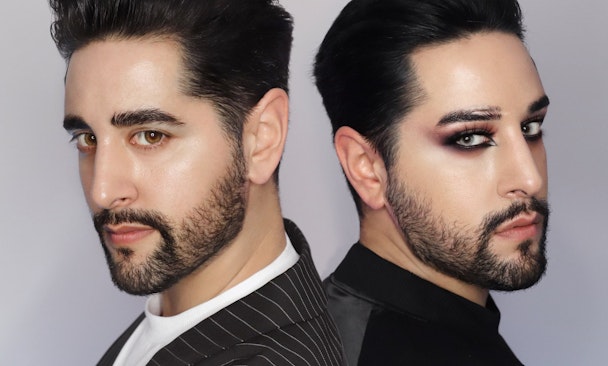Cult holds up a mirror to the beauty industry with a survey looking at non-binary marketing
As society’s understanding of gender boundaries are challenged and informed, brands that silo consumers into defined male/female stereotypes risk becoming obsolete. Gendered skincare could be considered, at best, a prejudiced outdated marketing tactic, or at worst, a socially-constructed cash cow. Young consumers increasingly define their own gender norms and recognise advertising’s portrayal of masculinity and femininity as clichéd tropes.

Cult release survey questioning gender bias in beauty, followed up by a chat with beauty influencer twins, James & Robert Welsh.
Creative agency Cult teamed up with The Diversity Standards Collective to discuss the potential of non-binary beauty.
The survey questioned 30 gender diverse individuals, revealing that of those questioned, 91% value the condition of their skin; 91% buy regular beauty products and maintain a skin routine; and 83% buy products that aren’t targeted at their gender. A further 65% said they wear make-up or nail polish regularly as part of their self-expression.
One interviewee shared: “I am a trans male but paint my nails everyday as a sign of anarchy, and i believe it looks nice…. I have never seen a marketing campaign explicitly feature a non-binary person, and it's very rare for queerness generally to be represented in beauty product or skincare marketing.”
In the wake of #MeToo, BLM, lockdown and even mental health awareness, brands are having to adapt as stereotypical male campaigns are in decline due to markets shifting away from toxic extremes.
Beauty brands must work harder to connect to consumers by behaving less predictably.
When discussing the role of brands in normalising diversity and inclusion in society, 83% of those surveyed believed brands have a direct responsibility to support changes in cultural norms around gender. Some 93% think brands should embrace gender inclusivity and 90% relate to those non-binary beauty products and marketing campaigns that already do. A total of 93% of participants feel beauty brands that merely market by gender are not relevant.
Another interviewee said: “'Woke brands' are total shams. They are only out to get money…Brands usually reflect the cultural landscape though, not push for change. When brands stand up for 'controversial' changes like trans visibility, it usually means that the change has taken hold and it's safe for the brand to 'support' the issue.”
Just 13% of the group feel the beauty industry has the right tone of voice when it comes to gender identity, while 97% agreed dividing consumers by gender identity only reinforces outdated social constructs. Fortunately, only 10% of the group felt they had not seen any positive shift in understanding over the last twelve months.
“By not being inclusive you are continuing to perpetuate the stereotype that only women want to look good," concluded another interviewee. "Gender is a spectrum and brands help shape the way people see the world. They should support positive change wherever they can. More than ever, people don't want to be hoodwinked or confused. We're dealing with enough as it is.”
Cult teamed up with top skincare Influencer James Welsh and his twin brother Robert Welsh - the global professional make-up artist and YouTuber - and The Diversity Standards Collective founder, Rich Miles, to discuss the survey and why beauty is so gender obsessed for a revealing video conversation.
The twins have a wealth of insight and experience on beauty and skincare, gender, race, sexuality and nonconformity; and take some of the world's biggest brands beyond their comfort zone to deliver tangible business value while Miles is active in helping educate the creative sector on diversity and inclusion.
Cult co-founder and CCO, Cat Turner, says: “The self-expression that the beauty industry facilitates means it is in a unique position to challenge traditional mindsets and elevate multiple definitions of beauty. Only brands that embrace the full spectrum of diversity and focus on universal themes that inspire and unite, rather than divide and shame, will become the brands of tomorrow. There is a huge opportunity right now to be guided by cultural needs and desires and transform the relationships brands can have with consumers.”
"Gender stereotypes have become outdated and the beauty industry needs to catch up with the mentality of their consumers in order to keep appealing to them. This research gives us great insight that cis gender males are rejecting the stereotyped images and masculine skewed beauty ranges that have been forced upon them for years and are now aligning more with non-binary ideals towards inclusive beauty," agrees Rich Miles.
Content by The Drum Network member:

CULT
Cult's ideas and insight take some of the world’s biggest beauty, fashion, luxury and wellness brands beyond their comfort zone to drive tangible business value....
Find out more
